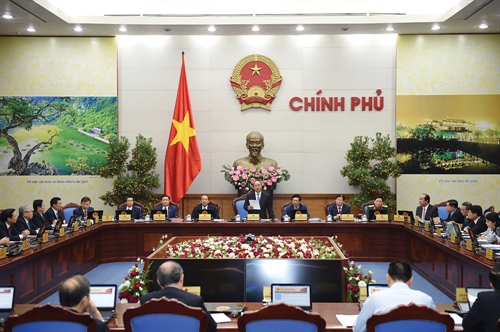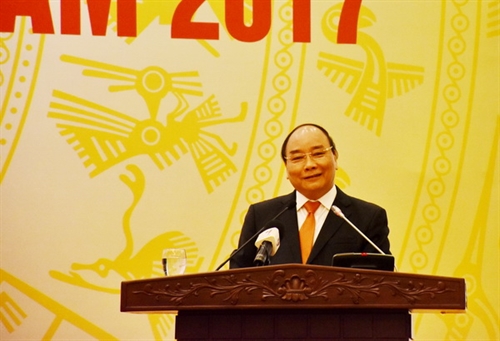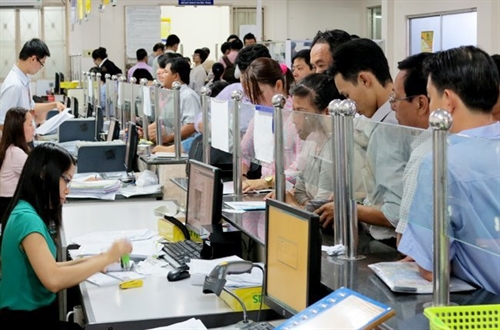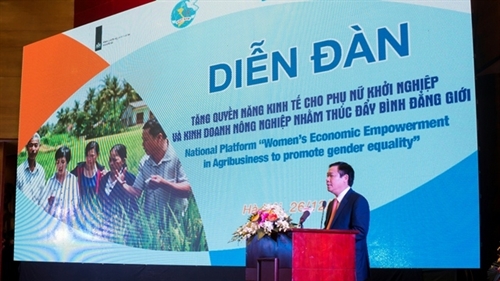Raising productivity and competitiveness of the economy and improving the business environment continue to be at the top of the Government’s agenda this year.
This is affirmed in two resolutions recently issued by the Government: Resolution 01/2017/NQ-CP of January 1, directing the implementation of the 2017 socio-economic development plan and state budget estimate and Resolution 19/2017/NQ-CP dated February 6, on continuing to improve the business environment and raise the national competitiveness in 2017, with a vision toward 2020.
New approaches to assessing the business environment
The Government, for the fourth year in a row, issued a separate resolution aimed at improving the business environment and raising the national competitiveness. The Resolution, numbered 19 as it was in the previous years, has many new contents.
While Resolutions 19 of the past three years placed emphasis on the World Bank’s 10 indices, Resolution 19 of 2017 uses as many as 250 indicators concerning business environment, renovation and creation, competitiveness, and e-government.
In the Resolution, the Government seeks to achieve the average level of ASEAN-4 nations by the end of 2017 in terms of business environment. For example, the starting a business index will be in top 70, the minority investor protection index will be in top 80, transparency and access to credit will be in top 30. Particularly, facilitation in loan access according to the World Economic Forum will be in top 40 by 2020.
Shortening the time required for implementation of administrative procedures is another target. Accordingly, the time for completing all formalities for tax and social insurance premium payment will be reduced to no more than 168 hours a year, including 119 hours for taxes and 49 hours for insurance. The maximum number of days to be spent on applying for construction permits and completing related procedures is set at 120.
The Government also sets to reach the average score of the ASEAN-4 countries in terms of competitiveness indicators of the World Economic Forum and catch up with the ASEAN-5 group with regard to the innovation index of the World Intellectual Property Organization - WIPO.
As for the e-government development index, an index introduced by the United Nations, the Resolution says comprehensive reforms will be stepped up to improve all three index groups, including telecommunications infrastructure index (TII), human capital index (HCI), and online services index (OSI), making the country ranked 80th by the end of 2017 and 70th by 2020 with a score equaling the average level of the ASEAN-5 nations.
According to Nguyen Minh Thao, head of the Business Environment and Competitiveness Department under the Central Institute for Economic Management (CIEM), the previous versions of Resolution 19 led to marked improvements in the Vietnamese business environment’s annual score and ranking on the ranking tables of the World Bank and other international ranking organizations. However, little improvement has been seen in Vietnam’s standing at the global competitiveness ranking of the World Economic Forum.
“This is the reason why this year the Government asks for solutions to improving productivity and national and corporate competitiveness, leading to addition of a wide range of indices,” Thao said.
“However, these criteria are accompanied by specific tasks and implementing agencies. This means that the responsibilities of each particular ministry and sector are clearly defined.” she said.
 |
| Cabinet meeting of January 2017 in Hanoi__Photo: VNA |
Specific tasks of central and local agencies
To achieve these targets, the Government assigns specific tasks to ministries, agencies and organizations. The Ministry of Planning and Investment will track improvements in the business environment and national competitiveness. The Ministry of Science and Technology will keep an eye on innovation indices. The Ministry of Information and Communications will be responsible for monitoring e-government indices.
Meanwhile, the Vietnam Chamber of Commerce and Industry (VCCI), the Vietnam Lawyers Association, the Vietnam Bar Federation, business associations and professional organizations will conduct independent surveys on the quality of administrative procedure settlement and, on that basis, put forward recommendations to the Government.
VCCI will raise the quality and prestige of the Provincial Competitiveness Index (PCI), support and direct local administrations to increase their PCIs. The Chamber will also collect opinions on policies and difficulties emerging in the performance of administrative procedures and report them to competent bodies for consideration and solution.
Resolution 19 also points out legal provisions to be revised or abolished, for example, Government Decree 69 of 2014 governing printing activities and Science and Technology Ministry Circular 35 of 2015 on the import of used machinery, equipment and technology lines. Particularly, it urges revision of the Competition Law to ensure fair competition, effective control of business monopoly and dominance and economic concentration, prompt settlement of petitions against abuse of monopolistic position or economic concentration, and timely detection and handling of violations.
Raising productivity and competitiveness of the economy
Earlier, in its first resolution of the year, the Government also sets its priorities for its work in 2017, including improving the business environment, encouraging startups, developing businesses, and raising productivity, quality, effectiveness and competitiveness.
To this end, ministries are requested to review and propose amendments to the current legal system so as to make it more business-friendly.
Specifically, the Ministry of Planning and Investment is asked to finalize the draft Law on Support for Small- and Medium-Sized Enterprises (SMEs) for submission to the National Assembly for passage right in 2017. In addition, it must further improve policies to support SMEs, especially creative businesses showing potential for development in a number of industries with competitive advantages. The ministry is also required to review and assess the current system of business investment conditions so as to lift unreasonable barriers and create a transparent and equal playing field for businesses.
To ease businesses’ access to loans, the Ministry of Finance is required to revise the mechanism on provision of credit guarantee for SMEs and issue regulations on governmental and private venture investment funds. Meanwhile, the State Bank will make ensure that banks apply solutions to support SMEs in access to their credit.
The Government also asks ministries, sectors and localities to join hands in effectively implementing existing incentive policies for businesses, especially those related to tax, credit, land and human resources, aiming to boost application of high technologies, develop supporting industries, promote hi-tech agriculture, and support small- and medium-sized enterprises. In addition, efforts should be concentrated on economic restructuring, renewal of the growth model, and improvement of growth quality, productivity and competitiveness.
The Government, in both resolutions, considers administrative reform and building of a modern and professional administrative system as a prime solution for improving national competitiveness.
In light of this, it requests the Ministry of Home Affairs to keep a close eye on administrative reforms nationwide. The ministry must, first of all, further study and propose measures to renew the Government’s direction work and elevate the responsibility of ministries to come up with reform initiatives.
Right in 2017, the National Public Service Portal will be launched. Administrative procedures will be further simplified and made public, facilitating the implementation by people and businesses as well as the supervision and removal of bottlenecks, if any, by related state agencies.
The Ministry of Justice will work with the Supreme People’s Court to finalize legal documents concerning the implementation of the 2015 Civil Procedure Code, accelerating the resolution of contractual and trade disputes. Besides, it must made harder efforts to reform administrative procedures in the judicial sector in line with the spirit of the 2015 Civil Procedure Code and the 2014 Law on Bankruptcy.
Local administrations are tasked to further simplify administrative procedures and apply information technology so as to cut time and costs for administrative transactions related to enterprise establishment. They must strictly follow the reform guidelines set in the Law on Enterprises and governmental decrees on business startup and enterprise registration. Local business registration agencies must work with tax, labor, and social security agencies to shorten the time for starting a business. Meanwhile, the single-window mechanism will be implemented in construction licensing, property ownership registration, tax, charge and fee payment, and land-related procedures.- (VLLF)









